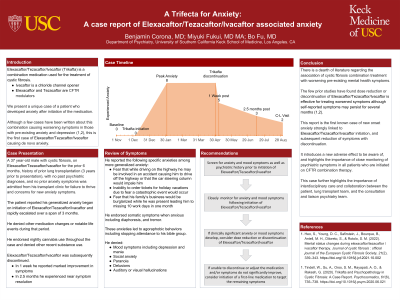Transplant Psychiatry
Session: Poster Session
(197) A Trifecta for Anxiety: A Case Report of Elexacaftor/Tezacaftor/Ivacaftor Associated Anxiety

Trainee Involvement: Yes

Miyuki Fukui, MD (she/her/hers)
Clinical Assistant Professor of Psychiatry and the Behavioral Sciences
Keck School of Medicine of University of Southern California, California, United States
Benjamin Corona, MD
Resident
Keck School of Medicine of the University of Southern California
Los Angeles, California, United States
Bo Fu, MD
Program Director, USC/LAC+USC Consultation Liaison Fellowship
USC Keck School of Medicine
Los Angeles, California, United States
Presenting Author(s)
Co-Author(s)
Elexacaftor/Tezacaftor/Ivacaftor is a medication that has been used for the treatment of cystic fibrosis. It is a combination of ivacaftor, a chloride channel opener, and elexacaftor and tezacaftor, CFTR modulators. We present a unique case of a patient who developed anxiety after initiation of the medication. Although a few cases have been written about this combination causing worsening symptoms in those with pre-existing anxiety and depression (Heo et al., 2022; Tindell et al., 2020), this is the first case of Elexacaftor/Tezacaftor/Ivacaftor causing anxiety in a patient with no prior psychiatric diagnosis. A 37 year-old male with cystic fibrosis, on Trikafta for the prior 6 months, history of prior lung transplantation (in 2017), no past psychiatric diagnoses, and no prior anxiety symptoms was admitted from his transplant clinic for failure to thrive and concerns for new anxiety symptoms. The patient reported his anxiety began on initiation of Trikafta and rapidly escalated over a span of 3 months. He did not report other medication changes or notable life events during that period. His anxiety became increasingly generalized although he focused on specific issues such as driving on the highway, planning for holidays, and a fear that his family’s business would be burglarized. It progressed to the point of significantly altering his behaviors, including stopping attendance in his bible group, taking ten sick days in one month, and minimizing the amount he needed to leave his house. He reported somatic symptoms when he would catastrophize including diaphoresis and tremor. He denied depressive symptoms, social anxiety, auditory or visual hallucinations, paranoia, or delusions during this time. Trikafta was subsequently discontinued and he reported a marked improvement after just 1 week with near symptom resolution in 2.5 months. Conclusion/Implications: There is a dearth of literature regarding the association of cystic fibrosis combination treatment with worsening pre-existing mental health symptoms. This report is the first known case of new onset anxiety strongly linked to Trikafta initiation, and subsequent resolution of symptoms with discontinuation. It introduces a new adverse effect to be aware of, and highlights the importance of close monitoring of psychiatric symptoms in all patients who are initiated on CFTR combination therapy. As anxiety can be debilitating and impact medical management and quality of life we recommend close monitoring of these patients especially by our medical colleagues and strong consideration to modify the medication if these symptoms arise. Heo, S., Young, D. C., Safirstein, J., Bourque, B., Antell, M. H., Diloreto, S., & Rotolo, S. M. (2022). Mental status changes during elexacaftor/tezacaftor / ivacaftor therapy. Journal of cystic fibrosis: official journal of the European Cystic Fibrosis Society, 21(2), 339–343. https://doi.org/10.1016/j.jcf.2021.10.002
Introduction:
Case:
References:
Tindell, W., Su, A., Oros, S. M., Rayapati, A. O., & Rakesh, G. (2020). Trikafta and Psychopathology in Cystic Fibrosis: A Case Report. Psychosomatics, 61(6), 735–738. https://doi.org/10.1016/j.psym.2020.06.021

